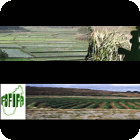Madagascar is a relatively large island located in Southern Africa. 80% of the Malagasy population derives its income from the agricultural sector, which contributes 30% of the GDP. Almost the totality of the agricultural crops that occur in the island have been imported there by an immigrant human population of relatively recent immigration status. For instance, vanilla, corn and groundnut are from America; pepper plant, bananas, mango and rice from Asia; and coffee and vigna from Africa.
While seven government agencies perform agricultural research in Madagascar, the private sector participation in research is increasing. NGOs are relatively new in Madagascar but achieved great advancement in agricultural research. The National Centre of Applied Research and Rural Development (FOFIFA) is the largest research agency in Madagascar, responsible for more than half the total agricultural research spending.
Important crops being researched are rice, vegetables, cotton, potatoes, corn, and coffee. Most of the plant breeding activities focus on germplasm enhancement.
The most limiting factor of Madagascar plant breeding activities is the inadequate number of breeders of each crop. Indeed, the country had a low number of national researchers, mostly with low-level training. Moreover, Madagascar experienced a dramatic decrease in public agricultural R&D budget. This is the result of funding which has been fairly dependent on government contributions, World Bank loans, and contributions from external donors.
Public institutes

National Center of Applied Research for Rural Development (FOFIFA)
Website available in French
FOFIFA is the largest research agency in Madagascar, responsible for more than half the total agricultural research spending. It was created in 1974 as a semi-autonomous institute under the Ministry of Rural Development, with an aim of unifying national agricultural research, the Malagasy government then entrusted to the FOFIFA the activities of research undertaken by the seven French institutes gathered within CIRAD and ORSTOM. FOFIFA’s infrastructure consists of 5 scientific departments and 8 satellite stations throughout the country.

Biotechnology and Plant Breeding Unit – Unité de Biotechnologie et de Sélection (UBS) du laboratoire de Physiologie végétale, Université d’Antananarive
Website available in French
UBS is one of the research units of the Laboratory of Plant Physiology of the Department of Plant Biology and Ecology – Faculty of Science, University of Antananarivo. The Laboratory of Plant Physiology started to work on plant breeding in 1997. For the moment, this unit deals only with rice genetic improvement. Tissue culture and doubled haploids of various rice mutant lines, as well as of the F1 generation are the main research subjects of the unit. As a university laboratory, its capacity is used by students to prepare their “DEA” and Doctorate degrees.
